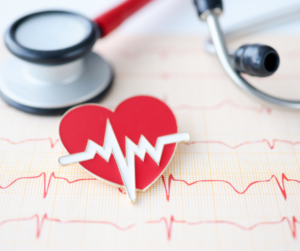Heart Health and Aging
 How does the heart work?
How does the heart work?
Your heart is a strong muscle that pumps blood to your body. A normal, healthy adult heart is about the size of your clenched fist. Just like an engine makes a car go, the heart keeps your body running. Different parts of the heart have different functions:
- The right side pumps blood to the lungs to pick up oxygen.
- The left side receives oxygen-rich blood from the lungs and pumps it through arteries throughout the body.
- An electrical system in the heart controls the heart rate (heartbeat or pulse) and coordinates the contraction of the heart’s top and bottom chambers.
How your heart changes with age
Aging causes changes in the heart and blood vessels. Here are some of the changes that could occur:
- As you get older, your heart can’t beat as fast during physical activity or times of stress. However, a person’s resting heart rate — the number of heart beats per minute at rest — does not change significantly with normal aging.
- You may feel fluttering in your chest or have the feeling that your heart is skipping a beat or beating too hard. Occasional extra or skipped heartbeats may occur more often with increased age and are not dangerous. However, more frequent and/or persistent feelings that your heart is fluttering or racing may be signs of a heart rhythm abnormality (arrhythmia), which may require treatment.
- Over time, the chambers of your heart may increase in size. The heart wall thickens, so the amount of blood that a chamber can hold may decrease, despite the increased overall heart size. Increased thickness of the heart wall can increase the risk of atrial fibrillation, a common heart rhythm problem in older people that can increase the risk of a stroke.
- The valves that control blood flow between the chambers of the heart may become thicker and stiffer. Stiffer valves can limit the flow of blood out of the heart or become leaky, both of which can cause fluid to build up in the lungs or in the legs, feet, and abdomen.
Changes in the heart and blood vessels that happen with age may increase a person’s risk of heart disease and related health problems. Heart disease is a major cause of disability that can limit activity and erode quality of life for older people. Talk with a doctor if you have any concerns about your heart as you age.
Some risk factors for heart disease may also be linked to cognitive health, including a person’s risk of dementia later in life. The good news is there are things you can do, such as controlling your blood pressure, that may help delay or lower your risk. Taking better care of your overall cardiovascular health can help protect both your brain and your heart.
